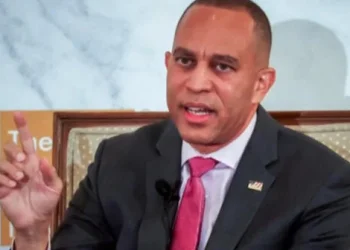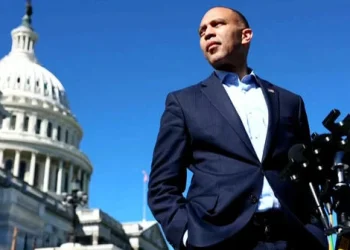The nomination of Paul Ingrassia, a far-right lawyer and incendiary podcaster who was President Trump’s pick to lead the Office of Special Counsel, collapsed Tuesday amid Republican opposition in the Senate, a day after Politico reported that he sent a series of racist text messages.
Mr. Ingrassia said in a social media post on Tuesday that he would not appear at his nomination hearing scheduled for later in the week. He cited senators who became upset with his choice to lead the independent anti-corruption agency after the release of a series of texts that, among other claims, used a racial slur to describe holidays honoring Black Americans and said people of Chinese and Indian descent could not be trusted.
“Unfortunately, I don’t have enough Republican votes right now,” Mr. Ingrassia wrote in a social media post Tuesday evening.
A White House official confirmed Tuesday evening the withdrawal of the nomination. White House officials did not respond Tuesday to further questions about Mr. Ingrassia’s nomination or whether he would remain in his current position as White House liaison to the Department of Homeland Security.
In his message, Mr. Ingrassia said he would “continue to serve President Trump and this administration to make America great again.”
The publication of these messages added to a swirl of controversy surrounding both Mr. Ingrassia, a self-described expert in “constitutional law,” and Mr. Trump’s role in trying to bend the Office of Special Counsel to his will. It also came just days after another Politico report showed that young Republican officials and activists regularly used racist and homophobic language and casually invoked Hitler and the Holocaust in a Telegram conversation.
At least four Republican senators, including Senate Majority Leader Sen. John Thune of South Dakota, have publicly signaled they would have opposed his nomination to the post, which is a traditionally independent anti-corruption agency that protects federal whistleblowers and enforces certain ethics laws.
Senator Rick Scott, Republican of Florida, told reporters Monday evening that he had spoken with the administration about Mr. Ingrassia but had not shared details. He told reporters: “I don’t support it.”
Four Republicans opposing him would be enough to kill his nomination if all senators were present and the entire Democratic caucus voted against him.
The New York Times was unable to independently verify the text messages, which Politico reported included telling a group of fellow Republicans that he had “a Nazi leaning” and that the federal holiday honoring the Rev. Martin Luther King Jr. should be “thrown into the seventh circle of hell.”
A lawyer for Mr. Ingrassia would not confirm that the texts were authentic and said they may have been manipulated or lacked context, Politico said.
Mr. Ingrassia, 30, was scheduled to testify Thursday about his nomination before the Senate Homeland Security and Governmental Affairs Committee. Senator Rand Paul of Kentucky, the Republican chairman of the panel, had indicated he would answer questions about the nominee before the hearing, although Mr. Ingrassia’s nomination was withdrawn before an announcement was made by the committee.
During the 2024 Republican primary, Mr. Ingrassia advanced a false theory that Nikki Haley was ineligible to run for president, which Mr. Trump then promoted on social media. In December 2020, as Mr. Trump contested his election loss to Joseph R. Biden Jr., Mr. Ingrassia’s podcast posted on Twitter: “It’s time for @realDonaldTrump to declare martial law and secure his re-election.” »
Mr. Ingrassia, who graduated from Cornell Law School in 2022, according to his LinkedIn profile, also represented “manosphere” influencer Andrew Tate, a self-described misogynist who faces rape and human trafficking charges overseas.
Mr. Trump launched a legal battle earlier this year by firing the former head of the Office of Special Counsel, Hampton Dellinger, challenging a fundamental precedent that Congress could limit the president’s power to fire the heads of independent agencies.
A one-sentence email to Mr. Dellinger on February 7 gave no reason to fire him, despite language in the statute that the special counsel “may be removed by the President only for ineffectiveness, neglect of duty, or malfeasance in the performance of his duties.” But Mr. Dellinger abandoned his legal fight in March after an appeals court ruled against him.
The change at the top of the office, which is charged with investigating appeals by federal employees who believe they were wrongfully fired, came as it scrutinizes mass layoffs of federal employees. Mr. Trump has since appointed loyalists on an interim basis to run the office.









